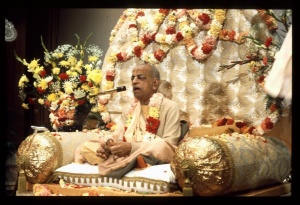SB 4.29.21: Difference between revisions
m (1 revision(s)) |
(Vanibot #0054 edit - transform synonyms into clickable links, which search similar occurrences) |
||
| (One intermediate revision by one other user not shown) | |||
| Line 1: | Line 1: | ||
{{info | {{info | ||
|speaker= | |speaker=Nārada Muni | ||
|listener=King | |listener=King Prācīnabarhiṣat | ||
}} | }} | ||
[[Category:Srimad-Bhagavatam - Canto 04 Chapter 29]] | |||
[[Category:Bhagavatam Verses Spoken by Narada Muni - Vanisource|042921]] | |||
<div style="float:left">'''[[Srimad-Bhagavatam]] - [[SB 4|Fourth Canto]] - [[SB 4.29: Talks Between Narada and King Pracinabarhi|Chapter 29: Talks Between Nārada and King Prācīnabarhi]]'''</div> | |||
<div style="float:right">[[File:Go-previous.png|link=SB 4.29.18-20]] '''[[SB 4.29.18-20]] - [[SB 4.29.22]]''' [[File:Go-next.png|link=SB 4.29.22]]</div> | |||
{{RandomImage}} | |||
==== TEXT 21 ==== | ==== TEXT 21 ==== | ||
<div | <div class="verse"> | ||
saṁvatsaraś caṇḍavegaḥ | :saṁvatsaraś caṇḍavegaḥ | ||
kālo yenopalakṣitaḥ | :kālo yenopalakṣitaḥ | ||
tasyāhānīha gandharvā | :tasyāhānīha gandharvā | ||
gandharvyo rātrayaḥ smṛtāḥ | :gandharvyo rātrayaḥ smṛtāḥ | ||
haranty āyuḥ parikrāntyā | :haranty āyuḥ parikrāntyā | ||
ṣaṣṭy-uttara-śata-trayam | :ṣaṣṭy-uttara-śata-trayam | ||
</div> | </div> | ||
| Line 18: | Line 24: | ||
==== SYNONYMS ==== | ==== SYNONYMS ==== | ||
<div | <div class="synonyms"> | ||
''[//vanipedia.org/wiki/Special:VaniSearch?s=saṁvatsaraḥ&tab=syno_o&ds=1 saṁvatsaraḥ]'' — year; ''[//vanipedia.org/wiki/Special:VaniSearch?s=caṇḍa&tab=syno_o&ds=1 caṇḍa]-[//vanipedia.org/wiki/Special:VaniSearch?s=vegaḥ&tab=syno_o&ds=1 vegaḥ]'' — called Caṇḍavega; ''[//vanipedia.org/wiki/Special:VaniSearch?s=kālaḥ&tab=syno_o&ds=1 kālaḥ]'' — time; ''[//vanipedia.org/wiki/Special:VaniSearch?s=yena&tab=syno_o&ds=1 yena]'' — by which; ''[//vanipedia.org/wiki/Special:VaniSearch?s=upalakṣitaḥ&tab=syno_o&ds=1 upalakṣitaḥ]'' — symbolized; ''[//vanipedia.org/wiki/Special:VaniSearch?s=tasya&tab=syno_o&ds=1 tasya]'' — of the duration of life; ''[//vanipedia.org/wiki/Special:VaniSearch?s=ahāni&tab=syno_o&ds=1 ahāni]'' — days; ''[//vanipedia.org/wiki/Special:VaniSearch?s=iha&tab=syno_o&ds=1 iha]'' — in this life; ''[//vanipedia.org/wiki/Special:VaniSearch?s=gandharvāḥ&tab=syno_o&ds=1 gandharvāḥ]'' — Gandharvas; ''[//vanipedia.org/wiki/Special:VaniSearch?s=gandharvyaḥ&tab=syno_o&ds=1 gandharvyaḥ]'' — Gandharvīs; ''[//vanipedia.org/wiki/Special:VaniSearch?s=rātrayaḥ&tab=syno_o&ds=1 rātrayaḥ]'' — nights; ''[//vanipedia.org/wiki/Special:VaniSearch?s=smṛtāḥ&tab=syno_o&ds=1 smṛtāḥ]'' — are understood; ''[//vanipedia.org/wiki/Special:VaniSearch?s=haranti&tab=syno_o&ds=1 haranti]'' — they take away; ''[//vanipedia.org/wiki/Special:VaniSearch?s=āyuḥ&tab=syno_o&ds=1 āyuḥ]'' — duration of life; ''[//vanipedia.org/wiki/Special:VaniSearch?s=parikrāntyā&tab=syno_o&ds=1 parikrāntyā]'' — by traveling; ''[//vanipedia.org/wiki/Special:VaniSearch?s=ṣaṣṭi&tab=syno_o&ds=1 ṣaṣṭi]'' — sixty; ''[//vanipedia.org/wiki/Special:VaniSearch?s=uttara&tab=syno_o&ds=1 uttara]'' — above; ''[//vanipedia.org/wiki/Special:VaniSearch?s=śata&tab=syno_o&ds=1 śata]'' — hundred; ''[//vanipedia.org/wiki/Special:VaniSearch?s=trayam&tab=syno_o&ds=1 trayam]'' — three. | |||
</div> | </div> | ||
| Line 25: | Line 31: | ||
==== TRANSLATION ==== | ==== TRANSLATION ==== | ||
<div | <div class="translation"> | ||
What was previously explained as Caṇḍavega, powerful time, is covered by days and nights, named Gandharvas and Gandharvīs. The body's life-span is gradually reduced by the passage of days and nights, which number 360. | What was previously explained as Caṇḍavega, powerful time, is covered by days and nights, named Gandharvas and Gandharvīs. The body's life-span is gradually reduced by the passage of days and nights, which number 360. | ||
</div> | </div> | ||
| Line 32: | Line 38: | ||
==== PURPORT ==== | ==== PURPORT ==== | ||
<div | <div class="purport"> | ||
The word parikrāntyā means "by traveling." The living entity travels on his chariot day and night during a year consisting of 360 (or more) days and nights. Life's progress is taken for the unnecessary labor required to cover these 360 days and nights of life. | The word ''parikrāntyā'' means "by traveling." The living entity travels on his chariot day and night during a year consisting of 360 (or more) days and nights. Life's progress is taken for the unnecessary labor required to cover these 360 days and nights of life. | ||
</div> | </div> | ||
__NOTOC__ | |||
<div style="float:right; clear:both;">[[File:Go-previous.png|link=SB 4.29.18-20]] '''[[SB 4.29.18-20]] - [[SB 4.29.22]]''' [[File:Go-next.png|link=SB 4.29.22]]</div> | |||
__NOTOC__ | |||
__NOEDITSECTION__ | |||
Latest revision as of 21:45, 18 February 2024

A.C. Bhaktivedanta Swami Prabhupada
TEXT 21
- saṁvatsaraś caṇḍavegaḥ
- kālo yenopalakṣitaḥ
- tasyāhānīha gandharvā
- gandharvyo rātrayaḥ smṛtāḥ
- haranty āyuḥ parikrāntyā
- ṣaṣṭy-uttara-śata-trayam
SYNONYMS
saṁvatsaraḥ — year; caṇḍa-vegaḥ — called Caṇḍavega; kālaḥ — time; yena — by which; upalakṣitaḥ — symbolized; tasya — of the duration of life; ahāni — days; iha — in this life; gandharvāḥ — Gandharvas; gandharvyaḥ — Gandharvīs; rātrayaḥ — nights; smṛtāḥ — are understood; haranti — they take away; āyuḥ — duration of life; parikrāntyā — by traveling; ṣaṣṭi — sixty; uttara — above; śata — hundred; trayam — three.
TRANSLATION
What was previously explained as Caṇḍavega, powerful time, is covered by days and nights, named Gandharvas and Gandharvīs. The body's life-span is gradually reduced by the passage of days and nights, which number 360.
PURPORT
The word parikrāntyā means "by traveling." The living entity travels on his chariot day and night during a year consisting of 360 (or more) days and nights. Life's progress is taken for the unnecessary labor required to cover these 360 days and nights of life.